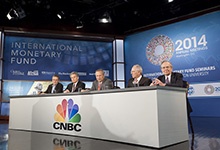
Typical street scene in Santa Ana, El Salvador. (Photo: iStock)
IMF Survey : Europe Needs to Act On All Fronts, Says Panel
October 15, 2014
- Europe’s economic outlook revised down
- Public infrastructure investment a key lever to boost growth
- Changing political situation, external risks pose challenges
Amid testing economic times for Europe, well managed investment in infrastructure, along with other structural reforms, stood out as a way to help kick-start the economy, according to panelists at an IMF seminar on the EU’s reform agenda, held on Thursday, October 9, during the IMF-World Bank Annual Meetings.

‘We think Europe could do better, but we worry it may do worse,’ say IMF’s Lipton. Panel (l-r): Bremmer, Lipton, Summers, Schäuble, and Padoan, (IMF photo)
EUROPE SEMINAR
German finance minister Wolfgang Schäuble and his Italian counterpart Pier Carlo Padoan assessed progress made since the crisis emerged. First, the single currency had been secured. “We had to overcome doubts and we did it more successfully than anyone expected,” said Schäuble.
It is now time to emphasize new priorities, according to Padoan. “Europe needs to focus on growth and jobs, having rightly addressed fiscal consolidation and banking union,” he said. Labor market reforms, aiming to boost employment including for youth, were one example of action underway in his country.
The economic climate remains difficult, reflected in warnings of the “new mediocre” in the latest IMF forecasts, and panelists generally agreed that Europe faced both demand and supply challenges. “We think Europe could do better and we worry it may do worse”, said David Lipton, the IMF’s First Deputy Managing Director. “What’s happening in Europe is not working,” warned Larry Summers, Harvard University Professor, who drew parallels with low output and deflation in 1990s Japan.
‘Yes, yes, yes’ to investment
The latest IMF World Economic Outlook calls for a push for well managed investment in public infrastructure. Could this be a good move for Europe? “Yes, yes, yes,” affirmed Summers emphatically.
“It’s best to operate on all fronts: to be supportive of demand and to carry out structural reforms,” said Lipton. The two go hand in hand, according to Summers, who said, “Strengthening demand makes structural reform easier.”
Schäuble underlined his support for the incoming European Commission’s €300 billion investment plan, while acknowledging it would take some months to identify and assess opportunities for investment. “Europe is sometimes a little bit slow and difficult but in the long term we are successful,” he added. Looking beyond infrastructure projects, he also highlighted his government’s commitment to invest in research and innovation.
Fighting debt with debt
“It is one of the great conundrums of macroeconomics that sometimes when there is debt—and it causes a lot of unemployment and slack—the answer is more debt,” said Lipton. Given the right economic conditions, properly managed infrastructure investments can pay for themselves in the form of lower debt burden, according to conclusions in the 2014 World Economic Outlook.
Internal EU politics, external threats
Eurasia Group President Ian Bremmer warned against underestimating the EU’s changing political landscape and emerging external risks. The rise of Euroskeptic parties could not be ignored. And whether considering Russia/Ukraine, Iraq/Syria or the Ebola outbreak, Europe is “massively more vulnerable” to these external threats than other major economies, such as the United States or Japan, he said.


